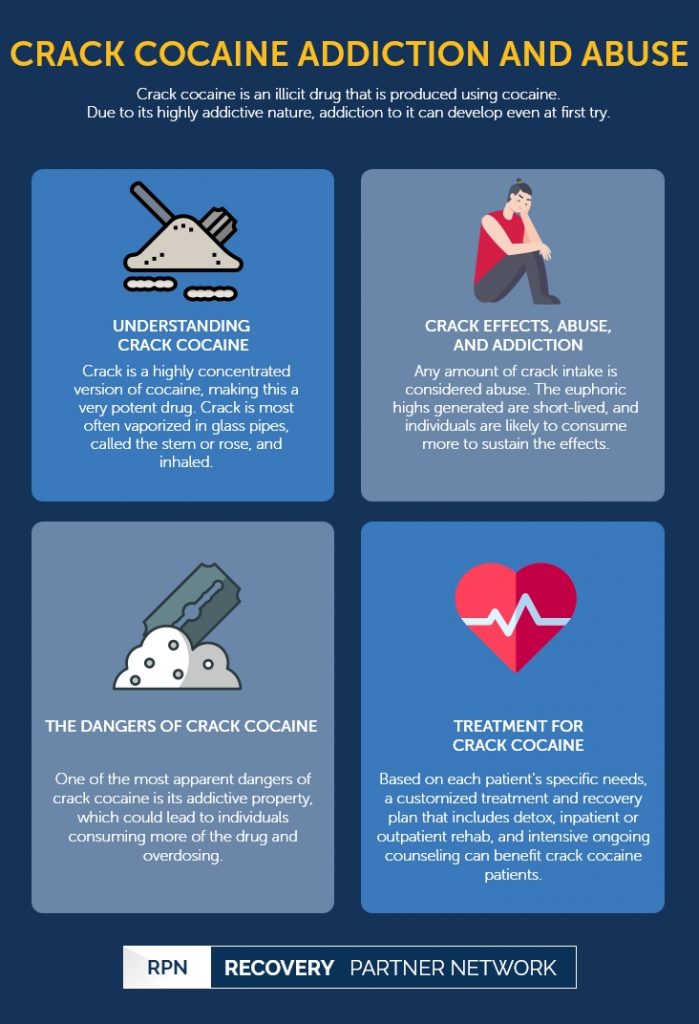

Long runs of sleepless days and nights had left me exhausted. I’d been using heavily for well over a year, eventually holed up in my house trying to run my business by telephone and avoiding direct contact with colleagues, friends, and family. I agreed to treatment mainly because I needed a rest. After decades of using various forms of “recreational” chemicals, which I had always been able to stop when things got too bad, I had finally met my match with crack cocaine. I arrived at rehab because of a problem with drugs. If you think that you or someone you love might have an addiction to crack, we understand and we can help. The good news is that real healing and recovery from crack addiction is possible. You need to take more and more to feel the same effects while becoming more sensitive to the negative side effects of this powerful drug. With regular use, tolerance to the euphoric effects of crack increases. It can be hard to quit crack once you have started. According to Health Canada, using crack for a long time can also lead to other serious mental and physical health problems including psychosis, seizures, and risk of hepatitis and HIV. There are also serious side effects from smoking crack and cocaine use overdose, high-blood pressure, stroke, lung damage, and kidney failure are some of the serious physical effects this drug can have on your body. Intense cravings, depression, anxiety, fatigue, irritability, anger, mood swings, and sleeplessness are all warning signs of crack withdrawal and addiction. The signs and symptoms of a crack addiction are the same as problem use or addiction to cocaine. Cocaine, including crack, is responsible for the highest costs to the Canadian criminal justice system of any drug in Canada.Ĭrack Addiction Symptoms and Side Effects.The rate of cocaine and crack use by older youth (ages 20-24) is increasing.The percentage of cocaine use, including crack, in the Canadian population is considered low (about 2%).In 2019, the Canadian Centre of Substance Use and Addiction reported that: This means that when used often and in higher doses, crack can be more addictive than regular cocaine. Crack Cocaine Addiction and Use in CanadaĪccording to Health Canada, the chemicals inside crack reach the brain very quickly. Like cocaine, it changes a person’s brain chemistry to produce feelings of euphoria (feeling ‘high’), being more alert, or energetic. Also known as rock and freebase, crack is the smokable form of cocaine.Ĭrack is highly addictive. What is Crack?Ĭrack is a powerful stimulant drug. We’ve helped almost 50,000 people recover from addiction. In this article, we’ll explain the difference between crack and cocaine, the side effects and symptoms of problem use, treatment options for a crack addiction, and the help available for healing and long-term recovery.Īs an accredited national leader in treating drug, alcohol, and food addiction for 50 years, Renascent offers intensive and personalized inpatient and outpatient programs that work. When getting and taking a drug becomes the central focus of your day, it puts a strain on your family, friends, work, health, and finances. Addiction to powerful drugs like crack makes it harder and harder to lead a healthy, normal life. If an addiction to crack is affecting your life, we understand and we can help.

The side effects and symptoms of addiction, including overdose, psychosis, and violent behaviour, also make it one of the most dangerous. Crack is considered the most addictive form of cocaine.


 0 kommentar(er)
0 kommentar(er)
